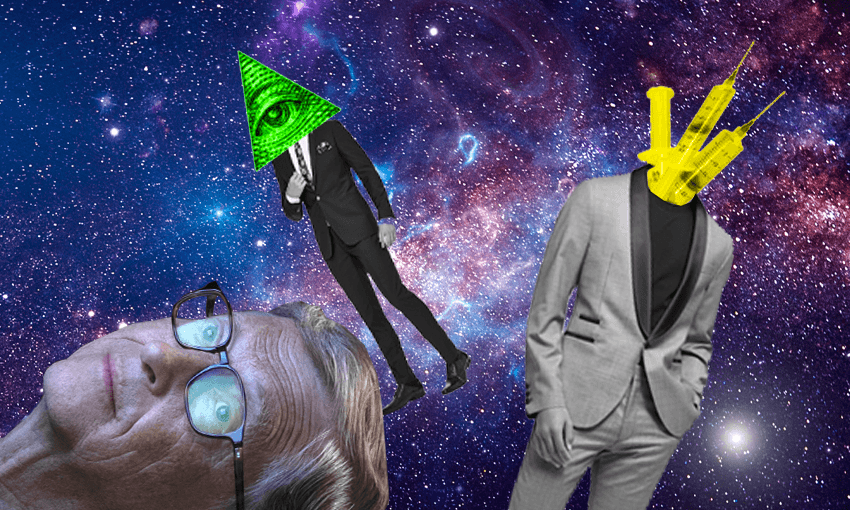New research suggests that, contrary to received wisdom, people with little sense of control over their lives aren’t any more susceptible than others to conspiracy theories.
While conspiracy theories have been around since the Middle Ages and its blood libels, in the past couple of decades they’ve experiencing something of a boom, with the rise of QAnon, Bill Gates and his vaccine-delivered microchips, Agenda 21, and the retro resurgence of MK-Ultra
This year’s pandemic has seen a major new proliferation of conspiracy theories. We’re getting Covid-19 from 5G and/or adrenochrome, or Covid-19 isn’t real at all and wearing a mask actually harms your immune system.
For researchers and laypeople alike, it’s long been assumed that conspiracy theories like these appeal most to people who have lost control over their personal lives. The idea is that when people need to find order in the world to explain their circumstances, conspiracy theories can do it.
Conspiracy theories can explain that a person’s problems are the result of the deep state, or criminal corporate activity. They can give people the chance to find meaning or connection between things, like seeing vapour trails (or, as they’re known in the conspiracy community, “chemtrails”) in the sky one day, and experiencing a tornado the next. For some, these events aren’t connected. For others, they provide a basis for believing chemtrails can cause tornadoes – and that, perhaps, the government sprayed them on purpose.
Such beliefs are becoming increasingly common, but new research from the University of Otago suggests feeling helpless in your personal life doesn’t make you more susceptible to them. There’s some correlation between people who’ve lost a sense of control and people who believe in conspiracy theories, but not much evidence to support causation.
Researchers Ana Stojanov, Jesse Bering, and Jamin Halberstadt conducted six studies, each with slight variations but all seeking to understand the relationship between conspiratorial thinking and a sense of control.
In one study, they found the group that described an event where they had a low level of control had “descriptively lower conspiracy beliefs than both the neutral and high control groups”.
Another study measured belief in specific conspiracies, and found, unexpectedly, that participants expressed stronger belief in conspiracy theories that did not involve secret control, like the New World Order conspiracy.
Ultimately, the authors found no support for the hypothesis that threats to an individual’s personal control motivate belief in a shadowy, clandestine entity that is secretly pulling the strings. Ana Stojanov, the lead author of the paper, told the Science Media Centre (SMC) that evidence for the “commonsense” argument about conspiracy theorists and a lack of control is “mixed, at best”.
“That said, our results should be interpreted with caution, since the manipulations we used for our experimental studies were artificial, and arguably less impactful, than the potent and overwhelming feelings of loss of control under disruptive real-world conditions.”
Other academics have weighed in on the research. Linda Waimarie Nikora, a professor at the University of Auckland, noted the authors’ reluctance to use their research to “reliably generalise” about Covid related conspiracies, but argued that the conversation is still worth having.
“I do think we have a challenge with conspiratorial thinking and this is on the rise. It is not helped by politicians in electioneering mode,” she said. “From a responsible ‘science’ perspective, I think the way to address ‘lack of control’ is to focus people’s attention on what they can control.”
Marc Wilson, a psychology professor at Victoria University of Wellington, observed that conspiratorial thinking had moved into the mainstream since 2001. “The events of 9/11 were a catalyst, if not a starting point, for a huge surge in both conspiracy theorising and interest in conspiracy theorising,” he told SMC. “Even in New Zealand, around a third of us endorse the idea that the US government knew about in advance, or actively planned, the 9/11 attacks.”
He thought the Otago research had the potential to disrupt psychologists’ understanding of conspiracy theories and the people who believe them.
“Lack of control has become a big stone in the foundation of psychological theorising of conspiracy belief,” he said.
“A strong reading is that we should bin the control hypothesis and focus on another candidate for best explanation of conspiracy belief. But we don’t have many more obvious candidates.”

